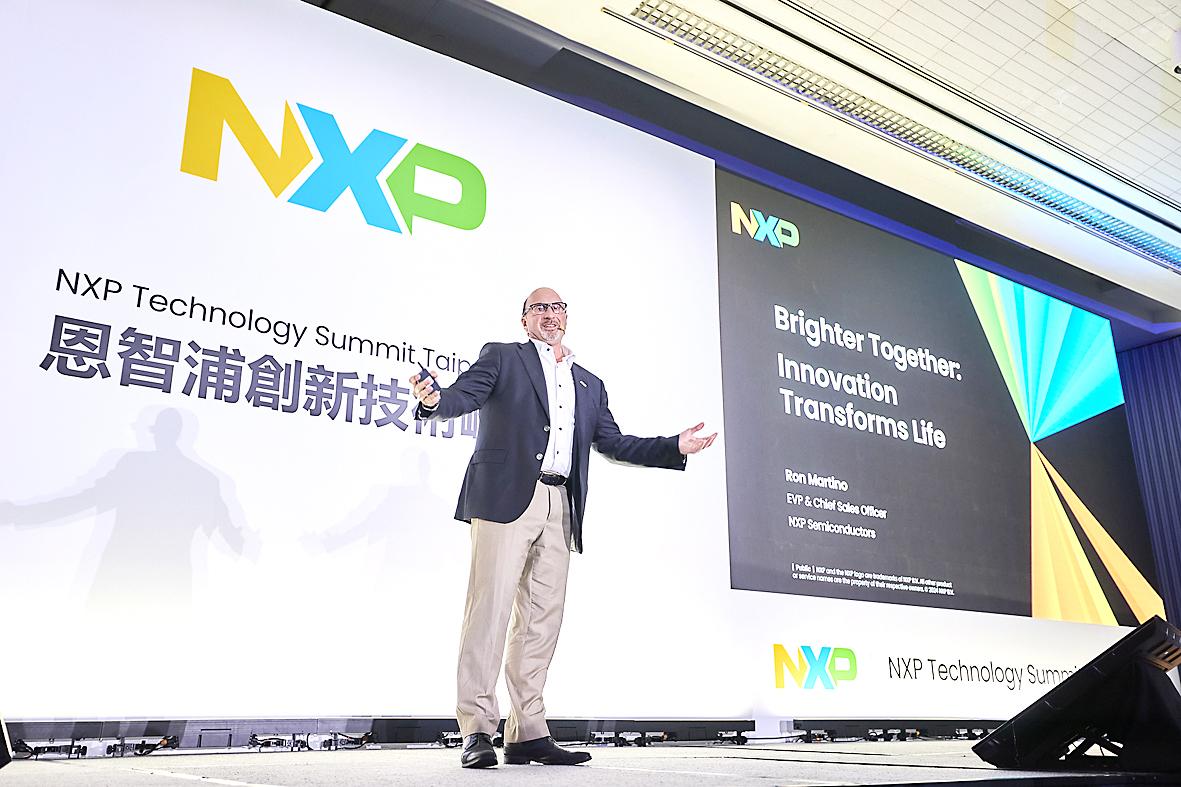The automotive and industrial Internet of Things are two major growth drivers for NXP Semiconductors NV in the next three years, despite the US’ tightening curbs on semiconductor exports to China, the world’s second-largest car chip supplier said yesterday.
The company expects the two segments to see business grow at between 8 and 12 percent from next year to 2027, NXP executive vice president and chief sales officer Ron Martino said at a media briefing in Taipei.
Martino attributed the growth mainly to an increase in semiconductor contents in cars, though the electric vehicle (EV) market is slowing and uncertainty about the world economy abounds, he said.

Photo on courtesy of NXP Semiconductors NV
Asked about what the US’ latest semiconductor export restrictions to China imply for the Dutch company, Martino said that NXP provides services in many countries and regions around the world, and it works to comply with all regulatory requirements placed on the company.
“We have been managing this for many years, very effectively, and we will continue to manage it as different regulatory requirements are applied to NXP,” Martino said.
“We continue to see a very healthy business. We continue to see that we work well together across all regions, with all parties,” he added.
China was the biggest market for NXP last year, representing 33 percent of the company’s total revenue.
The Asia-Pacific market, excluding China, came second with a 28 percent share.
In Taiwan, NXP has formed strong partnerships with Hon Hai Precision Industry Co (鴻海精密) and Foxtron Vehicles Technologies Co (鴻華先進) to introduce at least four EV models in a very short period of time, Martino said.
That is because NXP can bring its new technologies to the market faster in about one to two years, compared with a longer cycle of three to five years, he said.
Aside from Taiwan, such short development cycles only occur in some innovative and disruptive companies in the US or China, he said.
In related news, Hon Hai yesterday reported revenue last month grew 3.47 percent from a year earlier to NT$672.59 billion (US$20.73 billion), benefiting from strong demand for artificial intelligence servers and related components as well as new notebook computers.
“The second half of the year is traditionally the peak season for the information and communication technology industry, so operations are expected to gradually gain momentum quarter by quarter,” Hon Hai said in a statement.
Revenue this quarter is expected to “show significant growth on both a quarterly and yearly basis,” it said.
In the first 11 months, the company accumulated NT$6.21 trillion in revenue, an increase of 8.87 percent from NT$5.7 trillion in the same period last year, Hon Hai said.
Hon Hai, a major assembler of iPhones and AI servers powered by Nvidia Corp's chips, expected revenue this year to grow "significantly" from last year to reach an all-time high.

NEW IDENTITY: Known for its software, India has expanded into hardware, with its semiconductor industry growing from US$38bn in 2023 to US$45bn to US$50bn India on Saturday inaugurated its first semiconductor assembly and test facility, a milestone in the government’s push to reduce dependence on foreign chipmakers and stake a claim in a sector dominated by China. Indian Prime Minister Narendra Modi opened US firm Micron Technology Inc’s semiconductor assembly, test and packaging unit in his home state of Gujarat, hailing the “dawn of a new era” for India’s technology ambitions. “When young Indians look back in the future, they will see this decade as the turning point in our tech future,” Modi told the event, which was broadcast on his YouTube channel. The plant would convert

‘SEISMIC SHIFT’: The researcher forecast there would be about 1.1 billion mobile shipments this year, down from 1.26 billion the prior year and erasing years of gains The global smartphone market is expected to contract 12.9 percent this year due to the unprecedented memorychip shortage, marking “a crisis like no other,” researcher International Data Corp (IDC) said. The new forecast, a dramatic revision down from earlier estimates, gives the latest accounting of the ongoing memory crunch that is affecting every corner of the electronics industry. The demand for advanced memory to power artificial intelligence (AI) tasks has drained global supply until well into next year and jeopardizes the business model of many smartphone makers. IDC forecast about 1.1 billion mobile shipments this year, down from 1.26 billion the prior

People stand in a Pokemon store in Tokyo on Thursday. One of the world highest-grossing franchises is celebrated its 30th anniversary yesterday.

Zimbabwe’s ban on raw lithium exports is forcing Chinese miners to rethink their strategy, speeding up plans to process the metal locally instead of shipping it to China’s vast rechargeable battery industry. The country is Africa’s largest lithium producer and has one of the world’s largest reserves, according to the US Geological Survey (USGS). Zimbabwe already banned the export of lithium ore in 2022 and last year announced it would halt exports of lithium concentrates from January next year. However, on Wednesday it imposed the ban with immediate effect, leaving unclear what the lithium mining sector would do in the